France
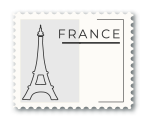
67.098.824
inhabitants
Official data *
9.966
Total hate crimes
Motivations with the highest number of hate crimes
 |
Racism and xenophobia |
| 3.729 (37,42%) |
 |
Anti-Christianism and other religions |
| 1.944 (19,51%) |
 |
Anti-Semitism |
| 1.614 (16,20%) |
Chronology of offences reported by the OSCE
Total 9.966
Civil society data
1.627
Total hate crimes
Motivations with the highest number of hate crimes
 |
Anti-Christianism |
| 767 (47,14%) |
 |
Anti-Semitism |
| 500 (30,73%) |
 |
Islamophobia |
| 221 (13,58%) |
crimes

47,14%
attacks of anti-Christianism

30,73% anti-Semitic crimes
Self sourced
Víctimas mortales identificadas
Official data
Víctimas en incidentes con resultados de muerte y heridos
Civil society data
Víctimas mortales
Determining the exact motivation for such killings involves a psychological and legal analysis of each case. Collecting data from journalistic and other open sources multiplies the motivations to be taken into account. The present classification is based on the motivations mentioned in the sources consulted.
| • | 1 Victim of anti-Christian attack |
| • | 1 Victim of racist attack |
| • | 2 Victims of anti-Semitic attacks |
| • | 2 Victims of attacks of multiple motivations |
| 2 men |
| 2 women |
| 1 transgender/transexual |
| 1 Not identified |
Figure 35: Map of France of identified hate crime mortal victims by motivation, 2015-June 2020
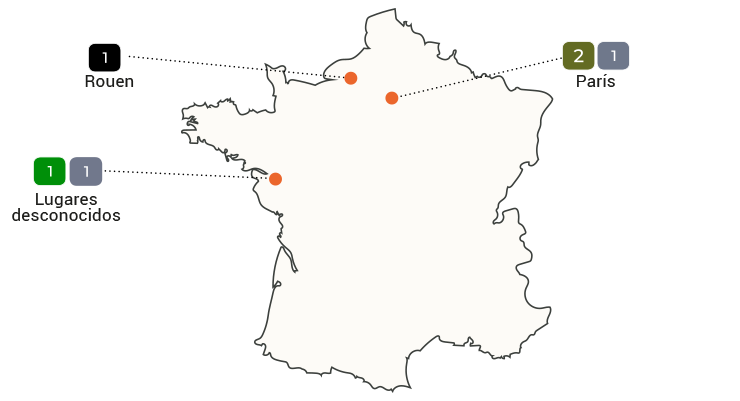
Terrorist attacks
| • | Total 258 mortal victims Jihadist-inspired attacks
|
Figure 36: Map of France of terrorism mortal victims by motivation, 2015-June 2020
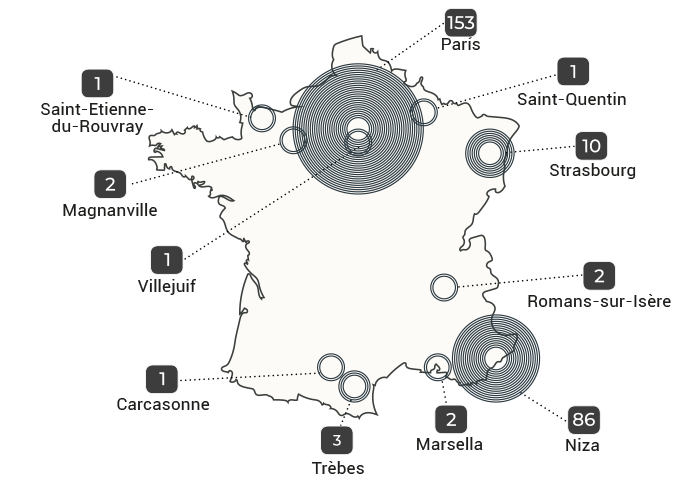
Jihadist-inspired attack
| Total deaths due to terrorist attack |
Figure 37: Map of France total mortal victims: identified victims and victims of terrorist attacks
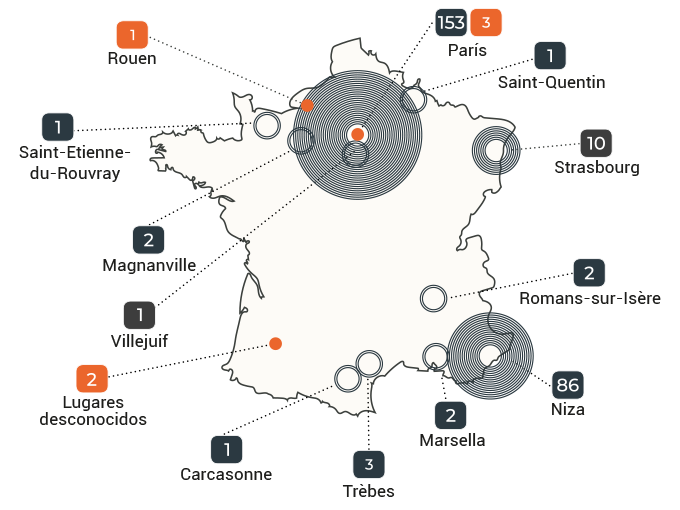
| • | Victims identified from self-sourced hate incidents (non-terrorism) 6 mortal victims
|
| • | Terrorist attack mortal victims 258 mortal victims
|
Official data
OSCE. Data collected by the OSCE places France as the country with the second highest number of hate crimes in this study. Between 2015 and 2018, 9,966 hate crimes were recorded by these sources. The main motivation for hate crimes was racism and xenophobia, with a total of 3,729 incidents recorded, corresponding to 37.42% of the data.
Attacks against Christian symbols represent the second category with the highest number of offences, being also the one with the highest increase through the years, going from a figure of 0 offences in 2015 to 2017, to 1,944 (19.51%) offences in 2018. Crimes with an anti-Semitic motivation also show a high figure, with a percentage of 16.20% (1614), completing the three most representative motivations.
Also noteworthy are the figures for crimes related to sexual orientation (12.67%) and those motivated by hatred towards the sex of the victim (8.43%), with the latter showing a very significant increase from 0 crimes reported between 2015 and 2017, to a figure of 840 cases in 2018.
The rest of the data for other motivations has decreased (attacks against members of other religions) or is very low (Islamophobia) or not collected at all (anti-Roma or homophobia), most likely subsumed in other categories.
On 7 December 2017, five members of the Identity Generation movement were convicted of incitement to racial and religious hatred. There were also arrests linked to far-right groups, including Action Française, who were planning a terrorist attack against several French politicians and mosques during the 2017 presidential elections. On 24 June 2018, ten members of the far-right group Action des Forces Opérationnelles (AFO) were arrested for planning a series of attacks against members of the Muslim community. On 14 September 2018, two former skinheads were convicted of the 2013 murder of Clément Méric, a young student and ultra-leftist activist.
In France, a proportion of racist, xenophobic and other incidents are linked to violent ultra-right groups.
Chronology of crimes reported by the OSCE
Total 9.966
In 2017, arrest were carried out linked to far-right groups, among them Action Francaise, who were planning a terrorist attack against various French politicians and mosques during the 2017 presidential elections.
Figure 38: Map of France with total number of hate incidents and motivations with highest percentages
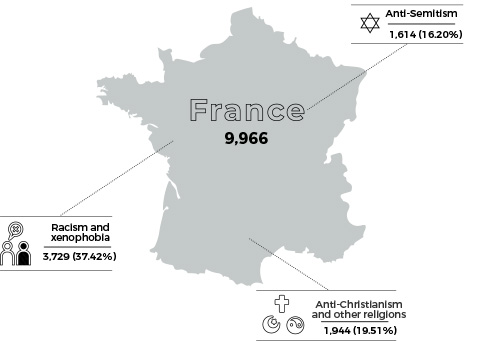
Figure 39: Total crime in France according to OSCE data by motivation, 2015-June 2020
Civil society data
The analysis of civil society data taken into account by the OSCE in its reports gives a figure of 1,627 offences. In 2015, the first year in which civil society reports are recorded in France, the figure rises to 742, the year with the highest number of cases, before falling gradually over the period to 112 incidents in 2020.
In 2020, the trend is clearly upwards: in half a year, the number of complaints for the whole of 2019 had been exceeded. Such data may be distorted by the incidence of the COVID pandemic in observatories or organisations that collect attacks and motivations. The motivation that has registered the highest number of crimes is that of attacks against Christian symbols, with the figure standing at 767 (47.14%), practically half of the total.
The number of anti-Semitic crimes is very high, reaching 500 (30.73%), with Islamophobic attacks closing the trio of the most numerous motivations at 221 (13.58%). Also noteworthy are those attacks motivated by racism and xenophobia, 60 (3.69%) and those motivated by homophobia, 48 (2.95%).
The rest of the motivations correspond to crimes that have not presented any figures (against members of other religions or people with disabilities) or the figure has been very low (anti-Roma 2 cases, i.e. 0.12%, or political intolerance 17 cases, i.e. 1.04%).
An elaborate system of statistics. Thanks to the rigorous work carried out by the French authorities, together with civil society, the French model today is the most advanced of the countries studied.
To record the hidden black figures, France has the National Consultative Commission on Human Rights, a state structure made up of 64 representatives of civil society organisations, which carries out a completely independent advisory and propositional role in the field of human rights for the government and parliament.
Assimilated to an Independent Administrative Authority (AAI), it is made up of organisations such as the International League against Racism and Anti-Semitism, the French Council of Muslim Worship, the Jewish Community Protection Services, etc. Its work includes the study of complaints of discrimination, particularly on grounds of origin, nationality or religious affiliation.
France has an elaborate and significant system of statistics.
France also has a significant body of statistics that provide a better understanding of these phenomena, where respondents can specify the “racist, anti-Semitic or xenophobic” nature of insults suffered since 2007, acts of threats since 2012 and physical violence since 2016. Finally, in 2018, new questions have been added.
In addition, two surveys including over 22,000 interviews with immigrants, descendants of immigrants, natives of an overseas department, descendants of natives and people from the “majority population” were carried out in 2009 and 2020, giving an insight into sentiment towards the population of immigrant origin.
In schools surveys are regularly carried out as well, typically in 3,300 public secondary schools, i.e. 43% of all secondary schools are surveyed.
France also has data from the Platform for Harmonisation, Analysis, Cross-Referencing and Reporting (PHAROS), which focuses on Internet crime.
PHAROS received in the internet domain
163.723 complaints in 2018
228.545 complaints in 2019
17.555 complaints incluided in the field of discrimination (7.68%)
In 2019, PHAROS received 228,545 complaints (compared to 163,723 in 2018), including 17,555 in the area of discrimination, i.e. 7.68% of total complaints (8.75% in 2018), taking into account that there can be several complaints for the same content. Social networks are the main medium for hate messages. Most of the reports concern US companies (Twitter: 8,376 reports, Facebook: 2,066, Youtube: 761).
France has also developed the Longitudinal Tolerance Index (ILT), which is calculated every year since its creation in 2008 to synthetically measure the evolution of prejudice. The closer the index is to 100, the more it reflects a high level of tolerance. It provides an overview of the evolution of annual opinions and feelings about minorities.
A downward trend in racist acts continued between 2015 and 2017, but figures reported since 2018 show an increase affecting all measured categories.
Anti-Muslim acts have recorded an overall increase of 54% over the past year, or 154 acts (compared to 100 in 2018). Recorded anti-Semitic acts have increased by 27%, from 541 in 2018 to 687 in 2019. It should be noted that these acts are mostly found in Ile-de-France. Other acts, grouped under the generic category of “racist acts”, recorded an overall increase of 131% (1,142 in 2019 compared to 496 in 2018). Black (218 vs. 137 in 2018, or +59%) and Arab (213 vs. 125 in 2018, or +70%) populations remain the most targeted. Police protection of synagogues is common in parts of France and Germany.
Legislative body. France has also enforced legal developments in the fight against discrimination, especially racism. On December 17, 2019, for the first time in a court decision, the industrial courts of Paris recognized “systemic racial discrimination” to describe an “organised system of racist domination” suffered by 25 Malians working on a construction site. Such a case is indicative of the use of workers from the African continent, undocumented, employed for “black market labour”, echoing latent anti-black racism. It also reflects an ethnic functional hierarchy, with white supervisors, employees of North African origin exercising local supervisory functions, and black people occupying the most dangerous positions.
In turn, discrimination against Gypsies had its most visible moment in the month of March 2019, marked by a series of attacks against people considered Gypsies following false rumors about the kidnapping of children by people assimilated to Roma. Thirty-seven physical and verbal attacks against this minority were recorded.
In 2017, 1.1 million people said they had suffered at least one racist act, i.e. 1 in 45. In 2019, the Ministry of Interior registered 5,730 crimes, and, only in 2018, the justice system has managed 1,385 prosecution dossiers, prosecuted 985 persons and pronounced 393 convictions.
Table 16: Annual evolution of hate incidents in France by type of motivation, 2015-June 2020
* Data for the first month of 2020
| FRANCE | TOTAL | Total (%) | 2015 | 2016 | 2017 | 2018 | 2019 | 2020* |
|---|---|---|---|---|---|---|---|---|
| Anti-Christianism and other religions | 767 | 47,14% | 117 | 154 | 150 | 183 | 73 | 90 |
| Anti-Semitism | 500 | 30,73% | 469 | 12 | 2 | 2 | 14 | 1 |
| Islamophobia | 221 | 13,58% | 124 | 53 | 22 | 15 | 5 | 2 |
| Racism and xenophobia | 60 | 3,69% | 26 | 21 | 1 | 4 | 5 | 3 |
| Crimes against sexual orientation | 48 | 2,95% | -- | 26 | -- | 13 | 6 | 3 |
| Political intolerance | 17 | 1,04% | 6 | 3 | 2 | 4 | 1 | 1 |
| Covid-19 discrimination | 12 | 0,74% | 0 | 0 | 0 | 0 | 0 | 12 |
| Anti-Gypsyism | 2 | 0,12% | -- | -- | 1 | -- | 1 | -- |
| TOTAL | 1.627 | -- | 742 | 269 | 178 | 221 | 105 | 112 |
Figure 40: Annual incidents in France by type of motivation. Civil Society Data
| TOTAL 1.362 | 2015 | 2016 | 2017 | 2018 | 2019 | 2020 | |
|---|---|---|---|---|---|---|---|
 | Anti-Christianism | ||||||
| 767(47,14%) | 117 | 154 | 150 | 183 | 73 | 90 | |
 | Anti-Semitism | ||||||
| 500 (30,73%) | 469 | 12 | 2 | 2 | 14 | 1 | |
 | Islamophobia | ||||||
| 221 (13,58%) | 124 | 53 | 22 | 15 | 5 | 2 | |
 | Racism and xenophobia | ||||||
| 60 (3,69%) | 26 | 21 | 1 | 4 | 5 | 3 | |
 | Crimes against sexual orientation | ||||||
| 48 (2,95%) | 26 | 13 | 6 | 3 | |||
 | Political intolerance | ||||||
| 17 (1,04%) | 6 | 3 | 2 | 4 | 1 | 1 | |
 | Covid-19 discrimination | ||||||
| 12 (0,74%) | 12 | ||||||
| Anti-Gypsyism | |||||||
| 2 (0,12%) | 1 | 1 |
Figure 40: Annual incidents in France by type of motivation. Civil Society Data
| TOTAL 1.362 | 2015 | 2016 | 2017 | 2018 | 2019 | 2020 | |
|---|---|---|---|---|---|---|---|
 | Anti-Christianism | ||||||
| 767(47,14%) | 117 | 154 | 150 | 183 | 73 | 90 | |
 | Anti-Semitism | ||||||
| 500 (30,73%) | 469 | 12 | 2 | 2 | 14 | 1 | |
 | Islamophobia | ||||||
| 221 (13,58%) | 124 | 53 | 22 | 15 | 5 | 2 | |
 | Racism and xenophobia | ||||||
| 60 (3,69%) | 26 | 21 | 1 | 4 | 5 | 3 | |
 | Crimes against sexual orientation | ||||||
| 48 (2,95%) | 26 | 13 | 6 | 3 | |||
 | Political intolerance | ||||||
| 17 (1,04%) | 6 | 3 | 2 | 4 | 1 | 1 | |
 | Covid-19 discrimination | ||||||
| 12 (0,74%) | 12 | ||||||
| Anti-Gypsyism | |||||||
| 2 (0,12%) | 1 | 1 |
* Includes crimes of intimidation of the judicial system.
Cases
RACIST KILLING IN ROUEN (FRA-1492). Guinean researcher Mamoudou Barry, 31, dies after being assaulted by a man who hurled racist insults at him in Rouen in July 2019. The victim was the father of a two-year-old girl. The alleged assailant, a 29-year-old man with a criminal record, was admitted to a psychiatric centre.
Vanesa Campos was one of the sex workers in the Bois de Boulogne, the largest park in Paris, who had been known to act as a spokesperson for her colleagues in the media.
The 36-year-old Peruvian transsexual worked there until the night of 16-17 August 2018, when she was shot in the chest, according to French media.
Although the details of what happened have not yet emerged, the testimonies of her colleagues suggest that Vanessa was killed when she confronted a group of criminals who were harassing them and their clients with an added component of homophobic motivation.
THE MURDER OF MIREILLE KNOLL (FRA-1358). Mireille Knoll, an 85-year-old Holocaust survivor, was stabbed to death, and her home in the 11th arrondissement of Paris was set on fire. In 1942, Knoll had managed to escape the Vél d’Hiv round-up, in which more than 13,000 Jews, including 4,000 children, were rounded up by French policemen under the Vichy regime and taken to the Auschtwitz extermination camp. Knoll’s mother, who had a Brazilian passport, managed to flee with the little girl to Portugal. Knoll later moved to Paris, where she married another Holocaust survivor who died a few years before she was murdered. Since she became a widow, she had lived alone in her flat, which on 23 March 2018 was entered by two young men who were later charged with a hate crime because of the anti-Semitic component of the crime. It later emerged that one of the accused, a Muslim of North African origin, was a neighbour of the victim.
MUDER OF A JEWISH DOCTOR (FRA-1092). Sarah Halimi, a 60-year-old Jewish woman and retired doctor, was murdered in her Paris home and her body defenestrated. The perpetrator was a 27-year-old man who shouted “Allahou Akbar” at the time of the crime and suffered from psychiatric problems. The courts declared that, because of these problems, he could not be criminally prosecuted, a decision that was not without protest.
A wave of ultra-violent attacks by extreme right-wing groups against the refugee camp in Calais. In February 2016, a report by the NGO Care4Calais revealed attacks that far-right groups were perpetrating against migrants in the refugee camp in the French town of Calais. Among the attacks recorded were beatings of migrants, who were allegedly stripped naked, handcuffed and beaten one by one.
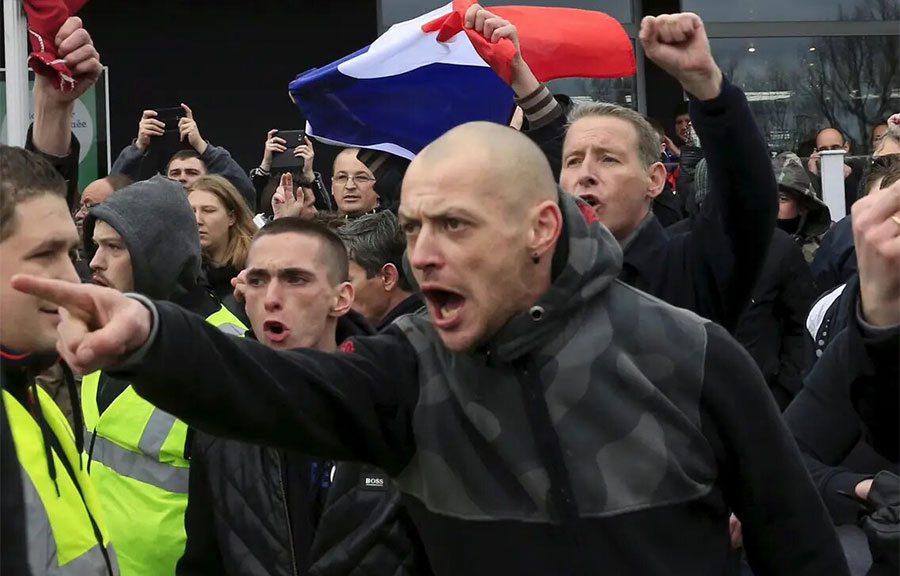
Rally of extreme right-wing supporters.
96 graves are desecrated at the Jewish cemetery in Quatzenheim. In the small village of Quatzenheim, a town of 780 inhabitants near Strasbourg, 96 of the 245 graves in the Jewish cemetery were desecrated in the early hours of 19 February 2019 with graffiti in German and swastikas. The President of the Republic, Emmanuel Macron, visited the cemetery and laid a white rose at the foot of the Deportation Memorial.
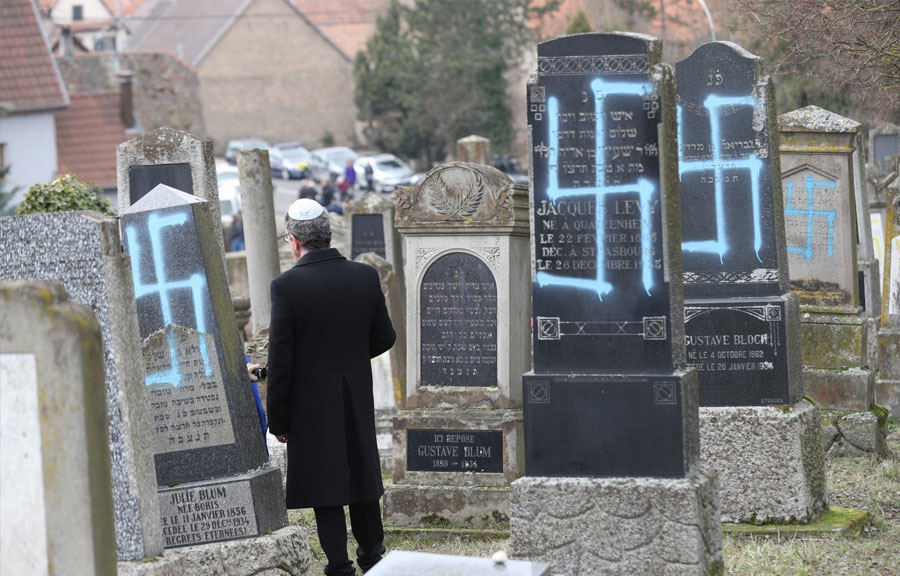
Swastikas on graves at Quatzenheim cemetery
FRANCE 2020: HATRED GENERATION IN THE WAKE OF THE ATTACKS IN FRANCE
Guillaume Denoix de Saint Marc
President of the French Association of Victims of Terrorism
The Association of Victims of Terrorism in France (AFVT) was particularly surprised in September 2020 by a resurgence of hate speech and calls for violence, using terrorist attacks as a vehicle for their propaganda.
Following the attack on French aid workers in Niger (https://www.afvt.org/attaque-au-niger) on 9 August 2020, social networks (in particular Twitter) and the internet (websites and blogs) were flooded with violent discourse and hate speech.
These posts were based on crime scene photos, with close-ups of the corpses, all embellished with hateful comments. Unfortunately, the victims’ families came across these images and comments during their legitimate searches on the internet to understand what had happened to their loved ones. Did this add to their trauma?
To our surprise, these photos and hate speech were not transmitted by jihadist spheres, but by extreme right-wing sites or activists. We had to intervene with platforms, hosts and also through the judiciary with the Public Prosecutor’s Office to put an end to these crimes.
We experienced the same situation after the murder of Professor Samuel Paty on 16 October 2020 with the publication and circulation of the photo of the teacher’s decapitated head, again accompanied by hateful comments.
And also after the attack of 29 October 2020 in Nice, with the publication of a photo of one of the two murdered women at the scene of the crime.
This reuse of acts of terrorism by another extremist group is not new, but the speed and scale of the phenomenon shows, on the one hand, a good organisation of users (trolls and other techniques) and, on the other hand, the use of technical or legal failures that could have stopped the spread of such photos or comments.
Since the loss of my father in a terrorist attack in 1989, I have been involved, along with other victims of terrorism, in the fight against violent extremism and in the defence of the fundamental rights that govern our societies. It is through law and pedagogy that we must fight against extremist hate messages and propaganda, guaranteeing freedom of expression and human rights and not being naïve about the systematic deviations that will be perpetrated by those who want to overthrow these values.


